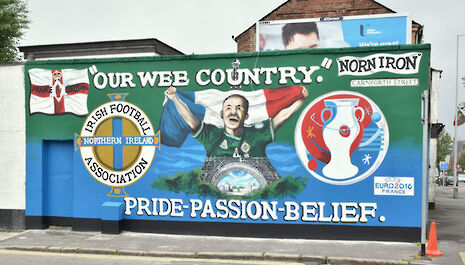Leaving our Troubles at home: Ireland at the Euros
Northern Ireland fan Ted Mackey looks at the contrasting behaviour of fans from England and Russia and those from the Emerald Isle

It was a beautiful, sunny evening in the industrial city of Lyon and, conforming to all Irish stereotypes, my friends and I were having a few pints in one of the many bars catering to fans.
Northern Ireland were set to play Ukraine the next morning, and spirits (in both senses of the word) were high. Lyon could almost have been a suburb of Belfast for the abundance of Northern Irish accents, and the never-ending mantra reminded us that Will Grigg was, indeed, on fire. So when my phone buzzed and I saw there was a message in our group chat, I was not expecting what came next.
Michael: "I’ve been tear gassed."
In a scene more suited to 1970s Belfast, Michael Jess, a 20-year-old student from Belfast, described how a fight had broken out between French supporters and another group, whom he did not recognise.
"We darted over the front exit to escape," he recalled, "when, to our dismay, it turned out the French police had tear-gassed that specific entrance to prevent the hooligans from escaping." He described how the tear gas looked and felt: "Similar to a blurry, mirage-like cloud, that whenever a person enters its vicinity, their eyes are immediately irritated to the point that they struggle to open them."
Jess also said that the high police presence was "pleasant to see", given the recent tragedies across France. The use of tear gas "was no doubt an extremely useful piece of equipment for the French police, but very unnerving for those Northern Irish fans who had never experienced this form of riot control ... a rare statement indeed," he joked.
Thankfully, Jess recovered from his encounter after a day’s rest, but this incident was merely a droplet in the wave of football violence that rocked Euro 2016 this year.
From the rise of Russian ‘Ultras’ – a group of extremely violent fans who combine football hooliganism with far-right nationalism – to 72 England fans whom the UK Football Policing Unit suspected were involved in ‘‘highly organised’’ violence, football fans and violence seem to go hand in hand.
However, among the many stories of violence at the Euros this year, it was Irish fans – both from Northern Ireland and the Republic – that emerged as the unlikely role models for responsible behaviour. In fact, the good behaviour of the Irish and Northern Irish fans was recognised when they were jointly awarded the Médaille de la Ville de Paris by the Mayor of Paris, who described them as "a model for all the supporters of the world".
Elsewhere, viral videos surfaced of fans helping a local change a tyre, officials clean up after a night of celebration in Lyon, and chanting "go home to your sexy wives" at Swedish fans, before the Scandinavians' match against Ireland in Paris. My best friend came home with both a Poland scarf and a Ukraine shirt, obtained through friendly swapping with rival fans.
So how does a nation known for its violent past produce such friendly football fans?
It is all a matter of perspective. The last time Northern Ireland qualified for a major tournament was the World Cup in 1986 – an event which has since become the topic of several books and films. Qualifying, for us, was an achievement in and of itself. For both Irish nations, the Euros symbolised not just a historic moment for our football teams, but also a chance to show the rest of Europe how far we have come.
While all fans are proud of their respective teams, the Irish and Northern Irish fans were simply proud to be there. It is a lesson in humility – a virtue that many England fans would do well to observe.
I could not help but feel a little bit smug as I watched Kolbeinn Sigþórsson’s shot slip past Joe Hart’s fingers and into the back of the net. It was the shot that secured England’s exit from the European Championships, and also the catalyst for hundreds of hours of analysis, criticism (of both players and former manager Roy Hodgson) and media coverage – how could England have lost... to Iceland?
Indeed, while the English team were lambasted for their poor performance, the Irish and Northern Irish teams were welcomed home as heroes. In a world where horrible things happen every day, it seems Irish fans know how to make the small victories count.
 News / CUP announces funding scheme for under-represented academics19 December 2025
News / CUP announces funding scheme for under-represented academics19 December 2025 News / SU reluctantly registers controversial women’s soc18 December 2025
News / SU reluctantly registers controversial women’s soc18 December 2025 News / Cambridge welcomes UK rejoining the Erasmus scheme20 December 2025
News / Cambridge welcomes UK rejoining the Erasmus scheme20 December 2025 Features / Should I stay or should I go? Cambridge students and alumni reflect on how their memories stay with them15 December 2025
Features / Should I stay or should I go? Cambridge students and alumni reflect on how their memories stay with them15 December 2025 Film & TV / Timothée Chalamet and the era-fication of film marketing21 December 2025
Film & TV / Timothée Chalamet and the era-fication of film marketing21 December 2025









